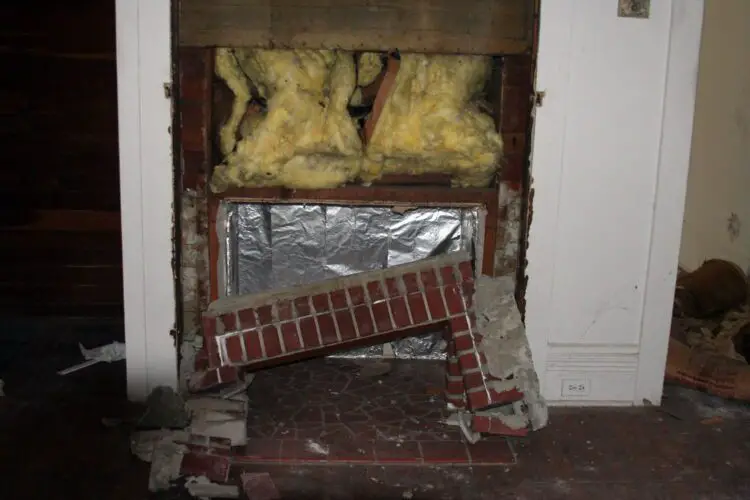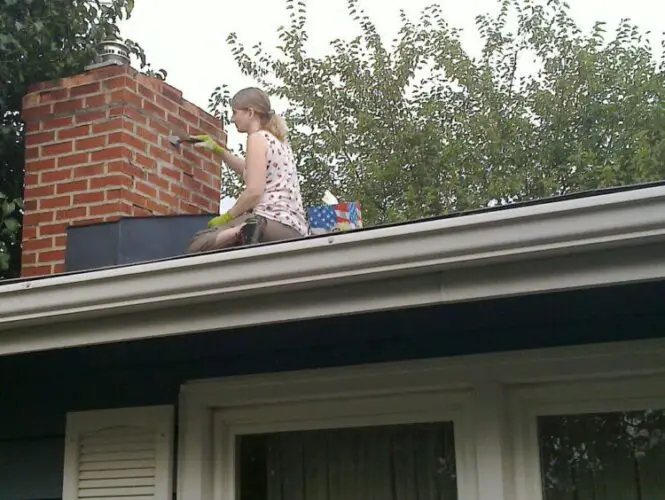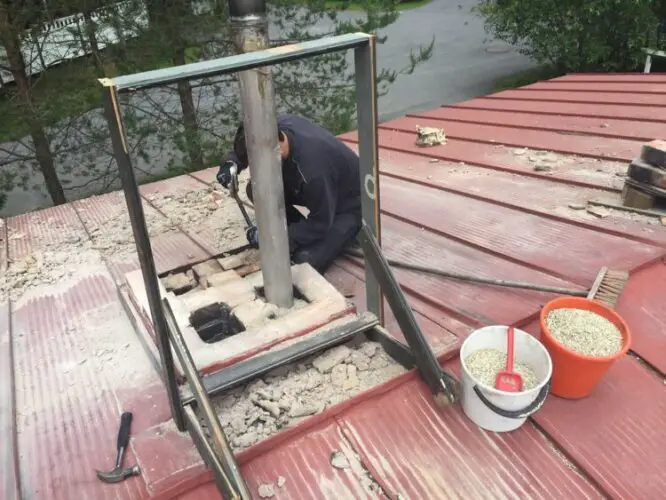A fireplace is often the heart of a home, providing warmth, comfort, and a cozy atmosphere during colder months. However, without proper maintenance, a chimney and fireplace repair can turn from a source of joy to a potential hazard. Common issues can arise, leading to safety concerns and expensive repairs. In this article, we will explore the common problems associated with chimneys and fireplaces, the importance of regular maintenance, signs indicating repair needs, DIY tips, the right materials for repair, when to hire a professional, costly mistakes to avoid, and how to find a reputable repair company.
Common Chimney and Fireplace Issues
- Creosote Buildup: Over time, the combustion process produces creosote, a flammable substance that can accumulate in the chimney. If not regularly cleaned, it poses a significant fire hazard.
- Cracked Masonry: Exposure to extreme temperatures can cause the masonry in your chimney and fireplace to crack. This compromises the structural integrity and can lead to safety issues.
- Damaged Chimney Crown: The chimney crown is crucial for keeping water out. Cracks or deterioration can allow water to seep in, causing further damage.
- Flue Obstructions: Blockages in the flue, such as bird nests or debris, can hinder proper ventilation, leading to smoke backing up into your home.
- Rust and Corrosion: Metal components, like the damper or firebox, are susceptible to rust and corrosion. This can weaken these parts and affect the efficiency of your fireplace.
The Importance of Regular Chimney and Fireplace Maintenance
Regular maintenance is the key to preventing serious issues with your chimney and fireplace. Here’s why it’s crucial:
- Safety First: A well-maintained chimney reduces the risk of fire hazards and carbon monoxide leaks, ensuring the safety of your home and family.
- Extended Lifespan: Regular cleaning and inspections can identify potential problems early, preventing them from escalating into costly repairs and extending the lifespan of your chimney and fireplace.
- Efficiency: A clean and well-maintained chimney operates more efficiently, providing better heat and reducing energy waste.
- Compliance with Regulations: Regular maintenance helps you comply with local safety regulations and building codes, ensuring your fireplace meets the necessary standards.
 Signs That Your Chimney or Fireplace May Need Repair
Signs That Your Chimney or Fireplace May Need Repair
- Visible Cracks or Damage: Inspect your chimney for visible cracks, spalling, or other signs of damage.
- Strange Odors: Unusual odors, especially during fireplace use, can indicate a problem with the chimney.
- Smoke Issues: If you notice an increase in smoke inside your home or a smoky odor, it could be a sign of blockages or ventilation problems.
- Water Stains: Water stains on the walls or ceiling near the fireplace indicate a potential issue with the chimney crown or flashing.
DIY Chimney and Fireplace Repair Tips
While some maintenance tasks are best left to professionals, there are several DIY steps you can take to keep your chimney and fireplace in good condition:
- Regular Cleaning: Use a chimney brush to remove creosote buildup, and clean the fireplace and hearth regularly.
- Inspecting for Damage: Check for cracks, loose bricks, or damaged mortar and repair them promptly.
- Replacing Damaged Components: If you notice rusted or corroded parts, such as the damper or firebox, replace them to ensure proper functioning.
- Installing a Chimney Cap: A chimney cap prevents debris, animals, and water from entering the chimney, reducing the risk of blockages and damage.
When to Hire a Professional for Chimney and Fireplace Repair
While some maintenance tasks can be done independently, certain issues require professional expertise. Consider hiring a professional when:
- Extensive Damage: If you notice significant structural damage, it’s best to consult a professional for a thorough assessment and repair.
- Flue Liner Issues: Damaged or deteriorating flue liners should be addressed by professionals to maintain proper ventilation and safety.
- Chimney Leaks: Water infiltration can cause extensive damage. Professionals can identify the source of leaks and provide effective solutions.
- Efficiency Problems: If your fireplace is not operating efficiently, professionals can diagnose and address the underlying issues.
Costly Mistakes to Avoid When Repairing a Chimney or Fireplace
- Ignoring Regular Maintenance: Neglecting routine cleaning and inspections can lead to costly repairs or, worse, fire hazards.
- DIY Extensive Repairs: While small repairs can be DIY projects, attempting major repairs without professional guidance can result in further damage.
- Using Incorrect Materials: Choosing the wrong materials for repairs can compromise the structural integrity of your chimney. Always use materials recommended by professionals.
- Incomplete Repairs: Fixing only the visible issues without addressing underlying problems can lead to recurring issues and additional costs.
Expert Advice on Choosing the Right Materials for Chimney and Fireplace Repair
Selecting the right materials is crucial for the longevity and effectiveness of chimney and fireplace repairs. Consult with professionals and consider the following:
- Firebrick: Used for repairing firebox interiors, firebrick is designed to withstand high temperatures and protect against heat damage.
- Stainless Steel Chimney Liners: These liners improve chimney draft and resist corrosion, enhancing safety and efficiency.
- Chimney Crown Sealant: Applying a high-quality sealant to the chimney crown helps protect against water damage and deterioration.
- Flashing Material: Quality flashing, usually made of metal, prevents water from entering the intersection between the chimney and roof.
The Benefits of Professional Chimney and Fireplace Repair Services
- Expertise and Experience: Professionals bring knowledge and experience to accurately diagnose issues and perform effective repairs.
- Safety Assurance: Professionals adhere to safety standards, ensuring that repairs are conducted with the utmost care to prevent hazards.
- Time and Cost Efficiency: Hiring professionals can save time and money by preventing costly mistakes and addressing issues promptly.
- Warranty and Guarantee: Reputable chimney and fireplace repair companies often provide warranties and guarantees for their work, giving you peace of mind.
How to Find a Reputable Chimney and Fireplace Repair Company
- Recommendations: Seek recommendations from friends, family, or neighbors who have had positive experiences with chimney and fireplace repair services.
- Online Reviews: Check online reviews on platforms like Yelp or Google to gauge the reputation of potential repair companies.
- Credentials and Certifications: Ensure that the company and its technicians have the necessary licenses, certifications, and insurance for chimney and fireplace repair.
- Get Multiple Quotes: Obtain quotes from different companies to compare prices and services, ensuring you get the best value for your investment.
Taking care of your chimney and fireplace is essential for both safety and enjoyment. Regular maintenance, timely repairs, and using the right materials can ensure that your fireplace remains a reliable and safe source of warmth. While some tasks can be handled independently, it’s crucial to recognize when professional expertise is needed to avoid costly mistakes. By following expert advice and investing in reputable chimney and fireplace repair services, you can enjoy the comfort of a well-maintained fireplace for years to come.
Frequently Asked Questions (FAQ) – Chimney and Fireplace Repair
1. Why is regular chimney and fireplace maintenance important?
Regular maintenance is crucial for several reasons. It ensures the safety of your home by reducing the risk of fire hazards and carbon monoxide leaks. Additionally, routine upkeep extends the lifespan of your chimney and fireplace, improves efficiency, and helps you comply with local safety regulations.
2. How often should I clean my chimney?
It is recommended to have your chimney professionally cleaned at least once a year, especially if you use your fireplace frequently. However, if you notice a significant buildup of creosote or other issues, more frequent cleanings may be necessary.
3. What are the signs that my chimney or fireplace needs repair?
Common signs include visible cracks or damage, strange odors, smoke issues, and water stains. If you notice any of these signs, it’s essential to address the problem promptly to prevent further damage.
4. Can I perform DIY repairs on my chimney and fireplace?
While some minor maintenance tasks can be done independently, it is advisable to consult professionals for major repairs. DIY projects should be limited to routine cleaning, inspecting for visible damage, and replacing small, non-structural components.
5. When should I hire a professional for chimney and fireplace repair?
Consider hiring a professional for extensive damage, flue liner issues, chimney leaks, and efficiency problems. Professionals have the expertise to assess the situation accurately and perform effective repairs.
6. What are the common mistakes to avoid when repairing a chimney or fireplace?
Avoid ignoring regular maintenance, attempting extensive DIY repairs without professional guidance, using incorrect materials, and incomplete repairs. These mistakes can lead to safety hazards and costly consequences.
7. How do I choose the right materials for chimney and fireplace repair?
Consult with professionals and consider using firebrick for firebox repairs, stainless steel chimney liners for improved draft and corrosion resistance, chimney crown sealant for protection against water damage, and quality flashing material to prevent water infiltration.
8. What are the benefits of hiring professional chimney and fireplace repair services?
Professional services offer expertise and experience, safety assurance, time and cost efficiency, and often come with warranties or guarantees. Hiring professionals ensures that repairs are conducted with precision and care.
9. How do I find a reputable chimney and fireplace repair company?
Seek recommendations from friends, family, or neighbors, check online reviews, ensure that the company has the necessary credentials and certifications, and obtain multiple quotes to compare prices and services. This comprehensive approach will help you find a reliable and reputable service provider.
10. Is it necessary to have a chimney cap?
Yes, installing a chimney cap is highly recommended. A chimney cap prevents debris, animals, and water from entering the chimney, reducing the risk of blockages and damage. It is an effective preventive measure that contributes to the overall health of your chimney and fireplace.


 Signs That Your Chimney or Fireplace May Need Repair
Signs That Your Chimney or Fireplace May Need Repair